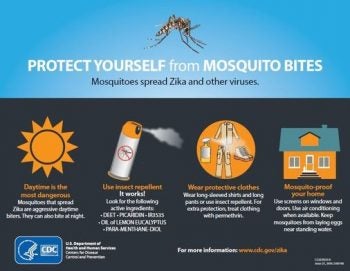Over the last year, newspapers and television stations in the Americas have reported hundreds of stories about the Zika epidemic. The media is flooded with news accounts of people suffering from temporary paralysis, infants with brain damage, and the fears the virus has unleashed, especially among pregnant women.
Yet despite these accounts—and thousands of warnings by governments, scientific organizations, and NGOs–large swathes of the population still fail to take the mosquito-borne disease seriously. By now Zika has swept through 45 countries. There have been more than 1 million suspected cases in Brazil alone and some 1700 incidents there of Zika-linked fetal brain damage. Latin America and the Caribbean, the epicenter for the disease, could suffer Zika-related losses this year of around US$3.5 billion, including forfeited tourism and productivity, according to World Bank estimates. Puerto Rico has been devastated. Still, many people in these areas feel that Zika poses no risk to them personally or that combatting the disease is out of their hands, posing a major challenge in a crisis in which individual prevention provides the best weapon.
I recently participated in an online conference sponsored by the IDB and the Governance Lab at New York University, aimed at overcoming these barriers and spurring people to action. Together the two organizations are hosting a series of online conferences between August and October of this year in partnership with the governments of Argentina, Panama, Colombia and the city of Rio de Janeiro. The idea is to bring experts together from around the world to find ways to communicate risks more effectively in fighting the disease.
Part of the problem, many experts agree, lies in changing the perception of risk. People tend to fear an illness if a family member, friend or the friend of a friend has been afflicted. They also may pay attention if a famous personality, like Barak Obama or Salma Hayek, succumbs. Otherwise, warnings can seem like an abstraction. One minute people hear there have been thousands of new cases of Zika over the last month in Brazil. The next minute they hear there were no cases of Zika at the Olympics in Rio de Janeiro. What is a person to believe? The challenge of making the public understand that an epidemic is close-at-hand, virulent and unyielding, while not overstating the risks, is enormous. Authorities must shake people from their apathy. But they also have to prevent them from panicking, so they don’t overuse insecticides or repellents, resign themselves to the inevitability of infection, or fail to take an epidemic seriously the next time it strikes.
Another challenge is getting people to realize that their action, or failure to act, affects them not only as individuals, but society as a whole. This is particularly important when it comes to Zika and other diseases, like dengue and chikungunya, which are spread by the Aedes aegypti species of mosquito. There is no vaccine for these diseases. Moreover, mosquito nets don’t help: the mosquitos bite in the day, not at night. That means people can best protect themselves by also protecting those around them: by eliminating things that collect the standing water where Aedes aegypti breeds, like old tires, garbage cans, plastic bags, flower pots and soda cans, and by participating in pesticide-spraying efforts.
Fashioning forceful and precisely targeted messages to get people to do so is crucial. One approach is through personal visits by authorities. These, as seen in an IDB study of efforts against tax evasion in Colombia, can be highly effective. Community Health Agents in Brazil, for example, have been going house to house to inform rich and poor residents alike about measures to fight Aedes aegypti.
Other kinds of messaging work best by focusing on particular sub-sectors of the population. Radio and television can engage older persons or less educated ones. Social media hones in better on younger people or NGOs. And in Virginia, one young mosquito biologist even wrote and produced a hip-hop video, in which he can be seen online in a backwards baseball cap, rapping about the use of repellent and the emptying of water containers. “Don’t get sick with Zika from the bite of a mosquit-a,” he repeats.
Whatever the approach of a given time and place, the key is ensuring that anti-Zika campaigns are sustained and mold to changing circumstances. That means not relaxing communication efforts during seasons when the mosquito is less active. And it means modifying them as good and bad news about the disease filters through and people’s perceptions of risk shifts. Just as private advertisers tailor their ads to fit new fashion trends and politicians reshape their political ads to suit the mood of the political season, authorities and their private partners in the fight against mosquito-borne diseases must always be ready to monitor beliefs and perceptions and revise the information, the message and the form of communication accordingly.
The struggle will be long. A genetically-modified version of Aedes aegypti with a lethal gene is currently being bred in captivity. It is being released into neighborhoods with the hope that it will kill off its own offspring and dramatically bring down the mosquito’s population. Researchers also are working on ways to infect the insect with a bacterium that would stop virus transmission. But these and other high-tech solutions are still years away from being widely applied. For now, the best solutions are elemental ones of trash and water disposal, repellent and targeted insecticide use, and permanent vigilance. In that battle, effective – and flexible — messaging, along with continuous monitoring to see what works and what doesn’t are the best remedies.


Leave a Reply